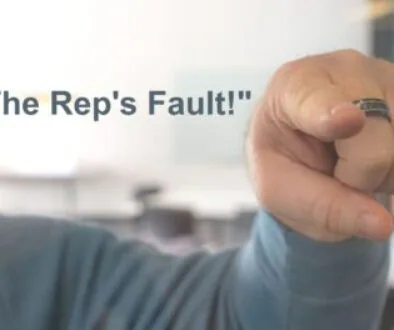From Hero to Zero: How to Fail at Medical Sales Even When You’re at the Top
If there was a dictionary where you could look up the term “medical sales professional,” you would see John’s picture. John was one of the best medical sales professionals I ever met. He personified motivation in that he awoke at 4:00am every day to read journals, study product literature, and educate himself about the medical specialty to which he sold. He would then hit the gym for an hour or so and arrive at his first hospital account before 7:00am.
When I walked through the hospital with John, I felt like I was with the CEO. He greeted everyone by name and everyone knew his name as well. Even the elderly Candy Stripers (hospital volunteers) knew John and they would stop what they were doing to hug him or shake his hand. John had a relationship with everyone who worked in the cafeteria, the patient transporters, as well as housekeeping personnel and others. As I met John’s customers, they acted as if he was not only a sales rep, but also a de facto staff member.
Even the stodgy, smug, and generally unfriendly Director of Purchasing yelled from her office, “If that’s John’s voice I hear, he better come in here and say hello.” And when John did, the supposedly difficult and salesperson-hating purchasing director smiled and thanked John for helping her to understand a complex pricing agreement, which she explained, was not by her request, but by John’s insistence to make sure she understood the document.
When I walked through the surgeon’s lounge with John, not only did John know every surgeon passing through, but more importantly, each of them knew John. This was surprising because John sold implants and instruments for Ophthalmology, yet he knew all of the cardiovascular guys, all of the general surgeons, orthopedic surgeons, ob-gyns…everybody!
I asked, “John, how do you know every surgeon in the hospital when only the eye surgeons can use what you sell?” John said, “Every surgeon is an opportunity to learn more about medicine, more about the hospital, more about their challenges, and it’s an opportunity to get to know some influential people, even though they don’t buy or use what I sell. I want them to be as comfortable and welcoming of me as the rest of the hospital staff. Plus I like to hedge my bets. I can’t control my entire future. One day I might be selling ortho, or CV, or who knows what. Besides, most of them are really cool people and I like them.”
If you’re thinking that this was John’s only account, you’re wrong. I visited three accounts with him that day and it was déjà-vu in each. John worked every account to the max and had I visited his other 13 accounts, I have no doubt that the experience would have been the same. Talk about account penetration!
John was a medical sales superstar. He earned so many President Club rings that he used some for paperweights in his office at home. At sales meetings, the junior sales reps would crowd around John to learn what they could from the master, hanging on his every word. And he earned an income that matched or exceeded what most of his physician-customers earned. John was truly at the top of his game.
Then the world changed.
Hospitals mandated a credentialing process that was required for sales reps to do business. John disregarded the request for credentialing, believing that his relationships and tenure made him exempt. He convinced himself that the rules were different for him than for other sales reps. Then one day, a security guard who knew John by name said, “John, I’m sorry but I’m not allowed to let you in because you’re not on the credentialed vendors list.” John said, “Fine. You call Dr. Edwards and tell him that you won’t let me in for his case.” The doctor already knew. He was using a different company’s products.
Another of John’s accounts requested a competitive bid for his products, which meant John’s company would have to discount its products significantly. John ignored it. He felt assured that his long term relationships with hospital staff and especially the surgeons would protect his business. He asked his surgeon-friends to go to bat for him. They said they wished that they could, but couldn’t. The doctors no longer had complete authority to choose which products they used. A million dollars worth of business dropped off of John’s sales numbers at one of his biggest accounts.
Unfortunately, the same scenario repeated itself at several other accounts. John eventually lost over 70% of his business and resigned from his position to sell home mortgages, a decision that eventually left him unemployed.
What happened? How could one of the highest-earning, most successful medical reps at the top of his game fall from grace?
John was doing all the things that were important then and are still important today. But John’s world changed and he didn’t change with it until it was too late. John clung to the belief that he needed to do nothing more than what had elevated and sustained him in the past. He was wrong.
You might think that the take-home message from this article is to “change as the business of medical sales changes.” It’s not. That postulate used to suffice, but it no longer does. The changes in healthcare are accelerating. The penalty for falling behind the change curve is irrelevance, that is, customers will replace you with competitors who anticipated and integrated change sooner and faster than you did. The take-home message is that you must remain relevant and to do that you must stay ahead of the change curve.
If you think your only job is to help your customers to provide care to their patients one day at a time, think again. Today’s healthcare customers expect suppliers to be able to anticipate and deliver what they will need tomorrow. Yes, you still must do almost everything you did to succeed in the past, but you also must anticipate change.
Your biggest medical sales challenge is no longer your competition. Your biggest challenge is staying relevant. How? Certainly by taking care of business today but you must also have regular “tomorrow conversations” with everyone on the expanding and changing list of decision-makers in your accounts. Learn to ask the critical-thinking questions that prove you really are a “partner” and not just a vendor. Don’t be complacent and don’t allow your customers to be complacent either. These tomorrow conversations may make your customers uncomfortable, but if you’re willing to discuss the things that your competition and your medical sales colleagues are not willing to discuss because they’re reactive instead of proactive, you’ll have something that your competitors won’t have—relevancy.
Change is inevitable and changes are occurring in healthcare faster than ever. Do you need a crystal ball to avoid having what happened to John happen to you? No, but you must be willing to ask the hard questions and prepared to deliver the desired and necessary solutions to your customers before they ask for them. The alternative is to risk becoming irrelevant at any moment.



@ 2:16 pm
Thanks very much, we are a medical consultory in Brazil and you provided a very useful information here!